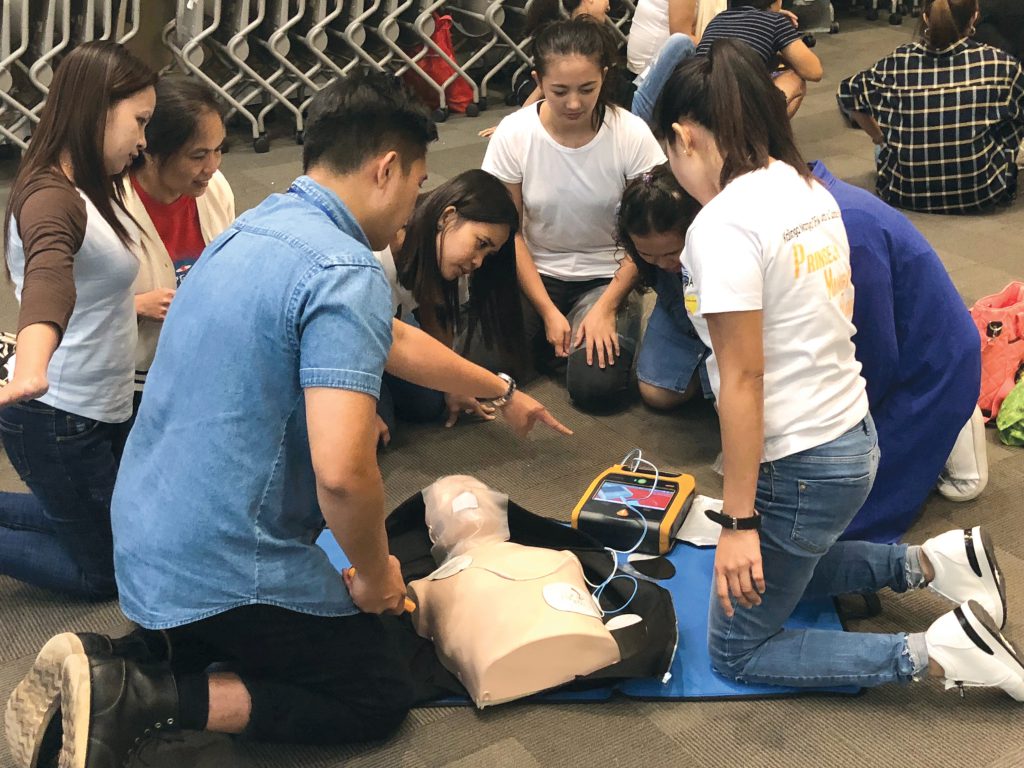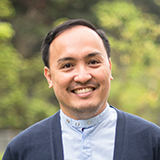November 2019 | Volume 21 No. 1
Cover Story
Empowering Domestic Workers with Knowledge
When Dr Michael Manio of the Li Ka Shing Faculty of Medicine’s Emergency Medicine Unit arrived in Hong Kong from the Philippines in 2010 to pursue PhD studies here, he was surprised to stumble across large crowds of Filipinas gathering in public places. “I thought they were homeless. In the Philippines you don’t see groups of women sitting out in the street like that,” he said. As he discovered in discussions with the women, this was just their normal day of. Since they are required to live in with their employers, meeting on the street is often the only place they can have privacy with friends.
That situation spurred Dr Manio to make a difference. After completing his PhD in 2014, he proposed the Domestic Worker Empowerment Project (DWEP) – re-branded in 2018 as EmpowerU – to equip the workers with knowledge so they can better care for themselves and their employers and improve their lives.
“The inspiration came from talking with the domestic workers. They told me they want to upgrade their skills and improve their work, but how can they do that if no one is teaching them? Here at the University, we have a pool of experts and we’ve tailor-made the curriculum for them,” Dr Manio said.
Currently, about 1,000 domestic workers gather every weekend for courses taught on campus by HKU academics (about 15 staff from different Faculties are involved), with support from HKU student interns.

Students being trained in cardiopulmonary resuscitation and fire safety by Hong Kong’s Fire Services Department.
Expanded offerings
The domestic workers pay a small fee to help cover administrative expenses for a one-year certificate programme that covers health and wellness, the law and their rights, business and financial matters such as saving for the future, recycling and other environmental protection measures, and media studies to enhance skills in photography, story-telling and video editing.
Participants are also trained in cardiopulmonary resuscitation and fire safety by Hong Kong’s Fire Services Department, and they learn computer skills. They can also take optional language courses in Cantonese and Japanese. Most importantly, they are connected to a broad network of NGOs, government bodies and other support services that can help them if they encounter difficulties.
Dr Manio’s partners in EmpowerU are David Bishop in the Faculty of Business and Economics and Lindsay Ernst in the Faculty of Law, who also both run Migrasia Global Solutions Ltd, a social enterprise incubator focussed on solutions for people who migrate. With their help, the EmpowerU programme has expanded over the past three years to nine courses, secured external donations such as computers and dress suits that the women can wear to class, and crowd-funded nearly HK$40,000.
And the domestic workers are not the only ones learning. The founders also hope student interns will have their eyes opened, too. “We want to involve our students because they will become future employers. It’s a chance for them to understand the lives of domestic workers and learn from them,” Dr Manio said.

The Domestic Worker Empowerment Project kicked off in 2014 with the participation of HKU students.
HKU students gain insights, too
Lilaine Kapangyarihan, a third-year Bachelor of Social Sciences student and a Filipina, was raised by domestic helpers and concurred. “Before I came to university, I hadn’t thought of their lives very much,” she said. “I came to EmpowerU to understand the culture more and the situation that domestic helpers are in, and maybe try to help them.”
Sheleoni Chung Ho-lam, a fourth-year Bachelor of Social Sciences student, was also raised by a domestic helper with whom she formed a special bond. She expressed sympathies for the difficulty helpers face in overcoming culture and communication in a foreign land, and she was impressed by the dynamism and enthusiasm of EmpowerU’s participants. “I’ve never seen a classroom so vibrant. They never fear asking questions and the classes are more like a conversation between the students and lecturers,” she said.
Mr Bishop of the Business Faculty sees great potential for EmpowerU. He would like to see it expand to help not only domestic workers in the region but also refugee asylum seekers and others in need, which could be done by recruiting other university partners and setting up online learning platforms. “My hope is that EmpowerU becomes the go-to learning platform for marginalised and disadvantaged populations across Asia,” he said.
Dr Manio, meanwhile, continues to work on making the HKU EmpowerU a success. He turned down tenure-track positions at universities in Korea and the Middle East so he could stay in Hong Kong. “It s a nice community at EmpowerU, like a family,” he said. “When I meet these domestic workers every weekend, I don’t consider it work. There is passion and commitment and I feel I am doing something worthwhile here in Hong Kong.”
They told me they want to upgrade their skills and improve their work, but how can they do that if no one is teaching them? Here at the University, we have a pool of experts and we’ve tailor-made the curriculum for them.

DR MICHAEL MANIO

